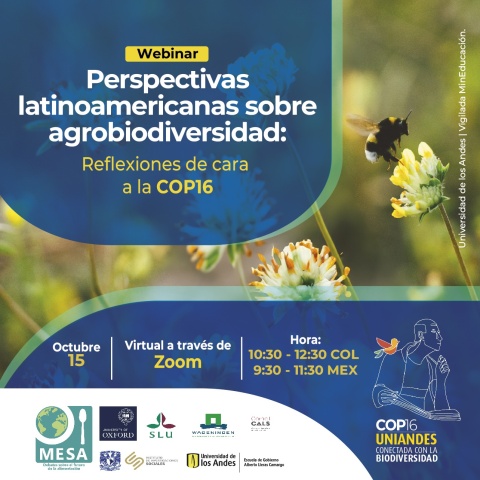
Español:
El 40% de la biodiversidad mundial está en la región de América Latina y el Caribe, donde se encuentran 6 de los 17 países con mayor diversidad biológica del mundo: México, Colombia, Brasil, Ecuador, Venezuela y Perú (UNEP, 2016). Asimismo, Latinoamérica alberga numerosas culturas y pueblos indígenas y afroamericanos, con diferentes conocimientos, perspectivas, valores y formas de estar en el mundo, lo que implica distintas maneras de interactuar y gestionar la diversidad biológica y la agrobiodiversidad (IPBES, 2018). Esto representa una valiosa oportunidad para planear y lograr futuros más justos y sostenibles.
La agrobiodiversidad tiene un papel central en la actual policrisis (cambio climático, malnutrición, pérdida de biodiversidad, inequidad) y enfrenta importantes presiones debido a fenómenos como los modelos agroindustriales de producción y consumo, el calentamiento global, la pérdida de conocimientos ancestrales, la contaminación y eutrofización de cuerpos de agua, las altas tasas de deforestación, la extinción de especies (insectos, plantas y animales), y la expansión de la minería a cielo abierto. Estas presiones, a su vez, son evidentes en el estado actual de la alimentación.
De este modo, el papel de la alimentación y la agrobiodiversidad en la actual policrisis ha ganado espacio en diversos escenarios de discusión sobre las políticas y estrategias que podrían aportar soluciones o transformaciones. Una de ellas es la Conferencia de las Partes del Convenio sobre la Diversidad Biológica (COP-16), que se celebrará en Cali, Colombia del 21 de octubre al 01 de noviembre de este año, y que presenta una oportunidad para reflexionar sobre preocupaciones, retos, intereses, perspectivas y estrategias que se desarrollan en la región para la conservación y uso sostenible de las agrobiodiversidades y sus conocimientos asociados.
Con este contexto, desde MESA les invitamos al webinar “Perspectivas latinoamericanas sobre agrobiodiversidad: Reflexiones de cara a la COP16”. El objetivo es explorar los diferentes valores y perspectivas en torno a las agrobiodiversidades en América Latina con el fin de entender los retos, las perspectivas y las estrategias para su conservación y uso. Para esto, buscamos dialogar sobre los aportes de los distintos conocimientos (tradicionales, científicos, técnicos, agroecológicos, etc) para detener o revertir la pérdida de agrobiodiversidad, así como las tensiones y sinergias entre estos.
Pronto anunciaremos las/los panelistas que nos acompañarán.
--------------------------
English description (note that the event will be in Spanish):
Forty percent of the world's biodiversity is in the Latin American and Caribbean region, where 6 of the 17 most biologically diverse countries in the world are located: Mexico, Colombia, Brazil, Ecuador, Venezuela and Peru (UNEP, 2016). Likewise, Latin America is home to numerous indigenous and Afro-American cultures and peoples, with different knowledge, perspectives, values and ways of being in the world, which implies different ways of interacting and managing biodiversity and agrobiodiversity (IPBES, 2018). This represents a valuable opportunity to achieve more sustainable and just futures.
Agrobiodiversity plays a central role in the current polycrisis and faces important pressures due to phenomena such as agroindustrial models of production and consumption that promotes monocultures and the intensive use of pesticides and herbicides, global warming, loss of ancestral knowledge, contamination and eutrophication of water bodies, high rates of deforestation, extinction of species (insects, plants and animals), and the expansion of opencast mining. These pressures, in turn, are evident in the current state of food and nutrition.
The role of food and agrobiodiversity in the current polycrisis has gained relevance in various policy scenarios that could provide solutions or transformations. One of them is the Conference of the Parties to the Convention on Biological Diversity (COP-16), to be held in Cali, Colombia from October 21 to November 1 of this year, which presents an opportunity to reflect on concerns, challenges, interests, perspectives and strategies being developed in the Latin America for the conservation and sustainable use of agrobiodiversities and associated knowledge.
In this context, TABLE invites you to the webinar “Latin American Perspectives on Agrobiodiversity: Reflections on COP16”. The objective is to explore the different values and perspectives on agrobiodiversity in Latin America in order to understand the challenges, perspectives and strategies for its conservation and use. To do this, we seek to discuss the contributions of different types of knowledge (traditional, scientific, technical, agroecological, etc.) to stop or reverse the loss of agrobiodiversity, as well as the tensions and synergies between them.
We will soon announce the panelists who will join us.
REGÍSTRATE EN EL SIGUIENTE BOTÓN / REGISTER BELOW

